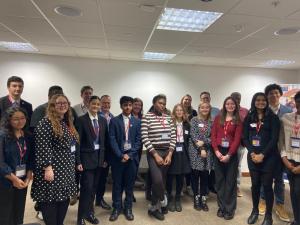After Ebenezer Scrooge promises the ghost of Future Yet To Come that “Christmas should be kept in our heart all year”, he wakes up on Christmas day a miser transformed: kinder, more generous and, most importantly, determined to do something to alleviate the hardship of others.
Perhaps the government needs its own phantom visitation, because while Westminster suffocates under Brexit, the oxygen is also being sucked from some of the vital issues of our present and future — such as how we improve the lives of children living in destitution.
While more people are in work than ever before, one in three children in this wealthy country of ours grows up poor. Many of them have working parents, sometimes holding down several jobs. Yet they are barely managing. Just last week the government’s own figures revealed more than 120,000 children in England will be spending Christmas in temporary accommodation. These experiences are unlikely to leave children with the warm and comforting festive childhood memories most of us carry with us through adulthood.
So as the ghost of Future Yet To Come “slowly, gravely and silently” approaches ministers, what vision would it reveal? One could be how a child growing up in poverty is less likely to succeed at school, less likely to find a good job with prospects for advancement and less likely to do well in life; more likely to suffer health problems and to die at a younger age. Another could reveal how councils on the financial edge will be simply unable to cope with the demand for children who need protection, and how the millions growing up in risky situations but just under the ever-rising thresholds will miss out on any help at all.
The ghost could show a malfunctioning universal credit system making life harder for even more vulnerable children, particularly those growing up in single-parent households. It could warn of the consequences of support being taken away from the families receiving help from the Troubled Families Programme, with nothing yet in its place when it ends next year. Or reveal a future with fewer Sure Starts and family hubs to help the families who need it most. The spirit of our future could reveal a country where we just accept the poverty that cascades down from generation of children to their children and their children after that — and the damage that entails for all of our society.
But, just as for Scrooge, this future does not need to be set in stone. There is still time this parliament to make positive changes, and an opportunity for the government to be remembered for caring about something other than survival and Brexit. Tackling the lifetime deficits for vulnerable children should be a long-term mission for whoever is in power — but in the short term, next year’s spending review is a good place to start. Here is a chance to show that children are a top political priority. They are this country’s future — not a 585-page deal with the EU.
If the chancellor is serious about austerity coming to an end, children need to be the biggest beneficiaries. The benefit freeze and two-child benefit cap are making life harder for many of the poorest families, and now transition to universal credit is coming down the tracks. Its roll-out should be halted until areas are given the resources to support the more vulnerable families with the transition. They need to reintroduce programmes that provide early help for families and children to avoid crisis.
If politicians still can’t see the necessity then they should just think politically. True, children don’t have a vote, but their parents and grandparents do and whenever the next election comes, the votes — particularly of thirty- and forty-somethings — will have a huge impact on the final result. Nor does doing nothing make economic sense: it is much more costly to wait until children fall into crisis. In the matter of children, a stitch in time saves nine.
Half a century after Charles Dickens wrote A Christmas Carol, another Charles roamed the streets of London, his conscience pricked by the depth and scale of the poverty he saw. The great social researcher Charles Booth and a team of assistants painstakingly charted, household by household, an entire socio-demographic map of the capital. Now available online, their drawings and notebooks are a fascinating insight into London life at the turn of the 20th century.
Today we have no need of teams of researchers; today we have technology, and that enables us to see, household by household, what their financial situation is and who is at risk of being tipped into crisis by the transition to universal credit. My challenge to ministers for the new year is to use this technology. We can create an entire map of poverty for England. And we can predict, household by household, child by child, who will be in crisis by Christmas next. In 2019 I am going to show them how.
When you see a train hurtling down the tracks towards a child, there is no excuse not to intervene. Councils and national government have the information they need to step in, to help families, to ensure that UC is an enabling and supportive system, not a punitive and destructive one. It would bring huge social and economic gains and, for the children, maybe next Christmas might not be so grim.
History tells us that governments can change the fate of their country’s children, but only when they really want to — and want to enough to make it a priority above other competing demands. If the government can find that determination, it should work quickly and urgently with a reforming zeal. The ghosts of Dickensian England must remain in the novels of our past.






